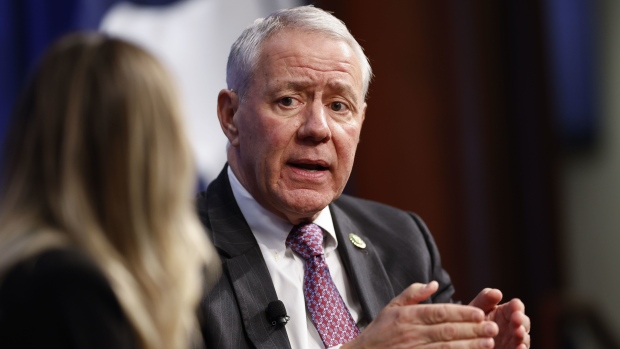Jan 27, 2023
House Republicans Pivot Away From Big Tech Antitrust Crackdown
, Bloomberg News

(Bloomberg) -- The new GOP House majority is turning away from last year’s bipartisan efforts to rein in the dominance of the largest tech companies with a change in leadership on a key panel.
The House Judiciary Committee on Friday announced Kentucky Republican Thomas Massie, a rigid libertarian, will serve as the head of the antitrust subcommittee. The appointment was a snub to Colorado Republican Ken Buck, one of the main House GOP critics of big tech companies, who was the panel’s ranking member in the last Congress.
Buck has urged Republicans to support updates to US antitrust laws to take on Amazon.com Inc, Alphabet Inc.’s Google, Meta Platforms Inc. and Apple Inc. He also worked across the aisle with Democrats on antitrust legislation and big tech investigations.
The appointment of Massie, a Massachusetts Institute of Technology-trained inventor who has filed dozens of patents, signals that the Judiciary Committee under Chair Jim Jordan of Ohio will shift its focus away from legislation aimed at curbing the power of the largest tech companies. Jordan has been more focused on free-speech issues, including big tech’s perceived liberal bias.
“We’re all united in wanting to stop the censorship of conservatives and the suppression of free speech,” Jordan said in an interview. “That’s going to be a focus of the full committee work.”
Big-tech critics rebuffed Massie’s appointment to the head of the antitrust subcommittee. Mike Davis, a Republican who runs the Internet Accountability Group, an anti-big tech organization, and previously worked for Iowa Republican Senator Chuck Grassley, said the move was “truly shameful.”
“Big tech has spent a ton of money in Washington DC and other places,” Buck said in an interview Friday. “The money has had the impact they intended. It has stifled the willingness to go after big tech with antitrust laws.”
Shift in Power
Buck’s views on breaking up companies such as Google and Amazon don’t align with Jordan, who alleges recent antitrust legislative efforts would facilitate big government collusion with Silicon Valley to censor conservative views.
Buck said he’ll press for antitrust legislation regardless of his committee position. As ranking member of the antitrust subcommittee, he pursued an anti-monopoly agenda with then-panel Chair David Cicilline, a Rhode Island Democrat, that included the American Innovation and Choice Online Act, a controversial effort that stalled after tech companies spent tens of millions of dollars on lobbying.
Buck said he intends to continue pushing his legislation that would crack down on Google’s alleged monopoly in online advertising — an effort that he says was boosted by the Justice Department’s antitrust case against Google, which was filed this week.
Read more: Google Faces Rare Jury Trial in DOJ Bet on Public’s Tech Unease
Jordan said he isn’t against antitrust legislation, but opposes bills that “would empower big government to further work with big tech to censor conservatives, which is what I thought the Democrat bills in the last congress were designed to do.”
Buck described Jordan’s antitrust issues as ideological, while House Majority Leader Kevin McCarthy — who has also been wary of antitrust legislation — has more pragmatic views and will push forward whatever bills have the bulk of his caucus’ support.
McCarthy has made tackling big tech a cornerstone of his Republican agenda, while making it clear that he has more interest in legislation about social media companies’ alleged censorship of conservatives online.
Massie didn’t immediately respond to a request for comment.
©2023 Bloomberg L.P.





